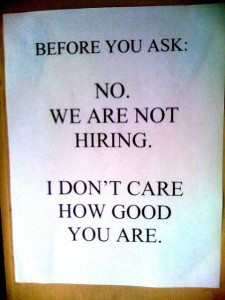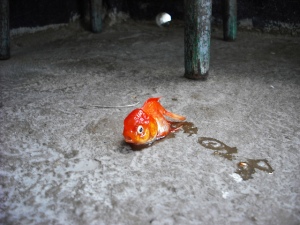 Looking for a job when you’re in the midst of a depression is really fucking hard. I think that’s step number one – acknowledge that what you’re doing is really really hard. It’d be hard for someone who’s healthy. And it’s especially hard for those of us who are not.
Looking for a job when you’re in the midst of a depression is really fucking hard. I think that’s step number one – acknowledge that what you’re doing is really really hard. It’d be hard for someone who’s healthy. And it’s especially hard for those of us who are not.
I’m currently in this position, having been told by my current employer that my contract won’t be renewed past January. Luckily for me, I’m not suffering from a major depressive episode, just trying to recover from one.
The thing is that I don’t have a lot of hope. Despite my fancy education and respectable resume, I don’t believe that any job could be fulfilling or rewarding or anything but awful, so the tasks of applying become almost impossible. I am FILLED with dread.
Then of course there’s the feeling of being overwhelmed. I am directionless because I find myself believing that every option is bad, so I’m unable to narrow things down. I also find it difficult, like many people looking for work, to convince myself that the next job won’t be forever. That it’s not one of the biggest decisions of my life. So it’s overwhelming both in breadth and in depth.
In a word: it sucks.
This is too complex a problem for a “Five Step Guide.” One has to do some soul searching and take each day as it comes. One has to build a schedule and stick to it. A schedule that includes off time, when you’re not thinking about the job search. A schedule that includes exercise and whatever other therapies work for you. I believe that one has to try to think ambitiously about what one is qualified for, and then do the hard work of reaching out to people. One must try not to think too far in the future or let themselves believe that they know what it holds.
 I am trying to be honest with my support network, which is difficult because they see more potential in me than I see in myself. I often feel like their advice is ludicrous: they tell me all the cool things I can do with my fish, not understanding that the fish are dead. So I am trying to fake it until I make it.
I am trying to be honest with my support network, which is difficult because they see more potential in me than I see in myself. I often feel like their advice is ludicrous: they tell me all the cool things I can do with my fish, not understanding that the fish are dead. So I am trying to fake it until I make it.
I’m trying not to “catastrophize” things. I am trying to remember that my job does not define me, that it is not the source of my happiness. I am trying to be patient and flexible. I am trying to think of this problem as circumstantial, not existential.
Anyone out there got a job they wanna give me? 🙂
First photo by BillsoPHOTO on Flickr.
 The trouble with the closet is that you have to lie ALL the time. I lie about my day, I lie about why I stopped drinking, I lie about my weight, my social life, my job, my plans.
The trouble with the closet is that you have to lie ALL the time. I lie about my day, I lie about why I stopped drinking, I lie about my weight, my social life, my job, my plans.



